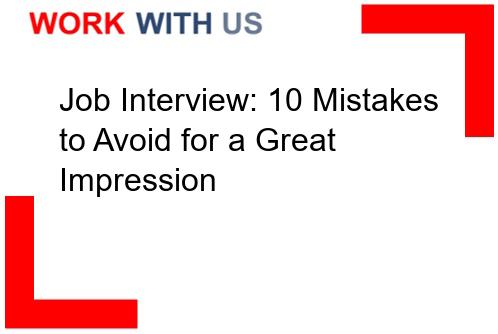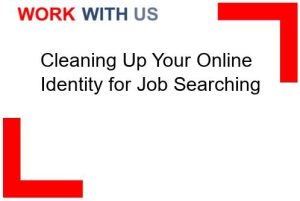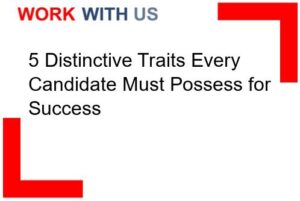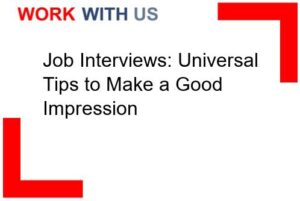Job interviews can be nerve-wracking experiences for many individuals. The pressure to make a great impression and secure the desired position can often lead to anxiety and mistakes. However, by being aware of common pitfalls and avoiding them, candidates can increase their chances of leaving a lasting positive impression on the interviewer. In this article, we will explore ten mistakes that job seekers should avoid during interviews to ensure a successful outcome.
First and foremost, arriving late to an interview is a major blunder that should be avoided at all costs. Punctuality is a crucial aspect of professionalism, and being late sends a negative message about a candidate’s reliability and commitment. To prevent this, candidates should plan their journey in advance, allowing extra time for unexpected delays.
Another common mistake is dressing inappropriately for the interview. The way a candidate presents themselves can significantly impact the interviewer’s perception. It is essential to dress professionally, adhering to the company’s dress code or opting for a conservative and well-groomed appearance if unsure. By dressing appropriately, candidates demonstrate their respect for the opportunity and their seriousness about the role.
Lack of preparation is another pitfall that can hinder a candidate’s chances of success. Failing to research the company, its values, and the role they are applying for can be detrimental. Interviewers expect candidates to have a basic understanding of the organization and to be able to articulate why they are interested in the position. By conducting thorough research, candidates can demonstrate their enthusiasm and commitment to the role.
During an interview, candidates should avoid speaking negatively about their previous employers or colleagues. Regardless of the circumstances, badmouthing others reflects poorly on the candidate’s professionalism and ability to work well with others. Instead, candidates should focus on highlighting their accomplishments and the positive experiences they gained from their previous roles.
One common mistake that candidates often make is talking too much or not enough. Finding the right balance is crucial. Rambling on or providing excessive information can make it difficult for the interviewer to extract relevant details. On the other hand, providing short and vague answers may leave the interviewer with unanswered questions. Candidates should aim to provide concise and relevant responses that showcase their skills and experiences effectively.
Another mistake to avoid is failing to ask thoughtful questions at the end of the interview. This is an opportunity for candidates to demonstrate their interest in the role and gain valuable insights about the company. By asking well-researched questions, candidates can leave a lasting impression and show their commitment to the position.
Candidates should also refrain from discussing salary and benefits too early in the interview process. While compensation is an important aspect, bringing it up too soon can give the impression that the candidate is solely motivated by financial gain. It is best to wait for the employer to initiate the salary discussion.
Lastly, candidates should avoid being overly casual or informal during the interview. Maintaining a professional demeanor and using appropriate language is crucial. Being too relaxed can give the impression that the candidate does not take the opportunity seriously.
In conclusion, job interviews can be challenging, but by avoiding these ten common mistakes, candidates can greatly improve their chances of making a positive impression. Punctuality, appropriate attire, thorough preparation, professionalism, effective communication, and thoughtful questions are all key elements to consider. By focusing on these aspects, candidates can increase their chances of leaving a lasting impression and securing their desired position.
Common body language mistakes to avoid during a job interview
During a job interview, nonverbal communication plays a crucial role in shaping the impression a candidate makes on the interviewer. Body language can convey confidence, professionalism, and engagement, or it can inadvertently send negative signals that may hinder one’s chances of securing the desired position. To ensure a successful interview, it is essential to be aware of common body language mistakes and actively avoid them.
One common mistake is failing to maintain eye contact. When a candidate avoids eye contact, it can be interpreted as a lack of confidence or disinterest. To counter this, the interviewee should make a conscious effort to maintain eye contact throughout the conversation. This demonstrates attentiveness and shows that they are actively engaged in the discussion.
Another mistake to avoid is poor posture. Slouching or leaning back in the chair can give the impression of laziness or a lack of enthusiasm. On the other hand, sitting up straight with shoulders back portrays confidence and professionalism. Maintaining good posture throughout the interview conveys a sense of self-assuredness and respect for the opportunity.
Excessive fidgeting is another body language mistake that can distract the interviewer and convey nervousness. Tapping fingers, shaking legs, or constantly adjusting clothing can indicate anxiety or a lack of composure. To combat this, candidates should strive to remain calm and composed, keeping their movements minimal and controlled. This will help project a sense of confidence and poise.
Inappropriate facial expressions can also hinder a candidate’s chances of success. Excessive smiling or laughing may come across as insincere or unprofessional. Conversely, a lack of facial expression can make the candidate appear disinterested or unengaged. Striking a balance between a warm, genuine smile and a composed, attentive expression is crucial to creating a positive impression.
Gesturing excessively can be another body language mistake to avoid. While some hand movements can enhance communication, excessive gesturing can be distracting and may indicate nervousness or a lack of focus. Candidates should aim for natural and purposeful gestures that complement their verbal communication without overpowering it.
Crossing arms or legs can create a barrier between the candidate and the interviewer, conveying defensiveness or a closed-off attitude. Open body language, on the other hand, signals approachability and receptiveness. Candidates should keep their arms relaxed and uncrossed, and their legs should be comfortably positioned without appearing too relaxed or too tense.
Maintaining appropriate personal space is also crucial during an interview. Invading the interviewer’s personal space can make them uncomfortable and create a negative impression. Conversely, standing too far away can make the candidate seem distant or disengaged. Striking a balance by maintaining a comfortable distance shows respect for personal boundaries while still demonstrating engagement.
Lastly, failing to control nervous habits can be detrimental to a candidate’s performance. Nail-biting, hair-twirling, or excessive sweating can all indicate anxiety or lack of confidence. Candidates should be mindful of their nervous habits and make a conscious effort to control them. Taking deep breaths, practicing relaxation techniques, and focusing on maintaining a calm demeanor can help mitigate these nervous tendencies.
In conclusion, body language plays a significant role in job interviews, and avoiding common mistakes is crucial to making a positive impression. Maintaining eye contact, practicing good posture, minimizing fidgeting, controlling facial expressions, using appropriate gestures, keeping an open body language, respecting personal space, and managing nervous habits are all essential aspects to consider. By being aware of these potential pitfalls and actively working to avoid them, candidates can enhance their chances of success and leave a lasting positive impression on the interviewer.
Effective ways to prepare for a job interview and avoid common pitfalls
Preparing for a job interview is crucial to increase the chances of success and avoid common pitfalls. It requires careful planning, research, and practice. By following effective strategies, individuals can present themselves confidently and impress potential employers. This comprehensive text will outline some key steps to prepare for a job interview and provide in-depth insights into various related topics.
Research the Company and Position
One of the first steps in preparing for a job interview is conducting thorough research on the company and the position being applied for. This includes understanding the company’s mission, values, products or services, and recent achievements. By familiarizing oneself with the company’s background, candidates can demonstrate their genuine interest and align their answers with the organization’s goals. Additionally, researching the position will help applicants understand the specific skills and qualifications required, enabling them to tailor their responses accordingly.
Review Common Interview Questions
Preparing for a job interview involves anticipating the questions that may be asked. Candidates should review common interview questions and prepare thoughtful and concise responses. These questions often revolve around one’s strengths and weaknesses, previous work experience, problem-solving abilities, and future goals. By practicing responses to these questions, individuals can feel more confident and articulate during the actual interview.
Practice Mock Interviews
Practicing mock interviews is an effective way to simulate the real interview experience and identify areas for improvement. Candidates can ask a friend or family member to act as the interviewer and provide feedback on their performance. Mock interviews help individuals refine their communication skills, body language, and overall presentation. It also allows them to become comfortable with answering questions under pressure, leading to a more polished performance during the actual interview.
Dress Professionally and Prepare Materials
First impressions matter, and dressing professionally is essential for a job interview. Candidates should choose appropriate attire that aligns with the company’s dress code and industry standards. It is better to be slightly overdressed than underdressed. Additionally, individuals should prepare a folder or portfolio containing copies of their resume, references, and any other relevant documents. This demonstrates preparedness and allows candidates to refer to these materials during the interview if needed.
Prepare Questions to Ask
Towards the end of an interview, candidates are often given the opportunity to ask questions. Preparing thoughtful and relevant questions shows genuine interest in the position and the company. It is advisable to ask about the company culture, opportunities for growth, or specific projects the candidate may be involved in. This not only helps gather important information but also showcases the candidate’s enthusiasm and engagement.
The Importance of Body Language
Body language plays a significant role in job interviews. It is essential to maintain good posture, make eye contact, and offer a firm handshake when greeting the interviewer. Non-verbal cues such as nodding, smiling, and maintaining an open posture can convey confidence and interest. Avoid fidgeting, crossing arms, or slouching, as these may indicate nervousness or disinterest. Being aware of one’s body language and making conscious efforts to project a positive image can greatly impact the interviewer’s perception.
Handling Difficult Questions
During an interview, candidates may encounter difficult or unexpected questions. It is crucial to remain calm and composed when faced with such situations. Instead of panicking, individuals should take a moment to gather their thoughts and respond thoughtfully. If unsure about a question, it is acceptable to ask for clarification or seek a moment to think before answering. Honesty and transparency are key, and it is better to admit not knowing something than providing incorrect information.
Follow-Up After the Interview
After the interview, it is essential to follow up with a thank-you note or email to express gratitude for the opportunity. This simple gesture shows professionalism and appreciation. Candidates can also use this opportunity to reiterate their interest in the position and briefly summarize why they believe they are a good fit. Following up allows individuals to leave a lasting impression and keeps them on the interviewer’s radar.
In conclusion, effective preparation is vital for a successful job interview. By researching the company and position, reviewing common interview questions, practicing mock interviews, dressing professionally, preparing questions to ask, being mindful of body language, handling difficult questions with composure, and following up after the interview, candidates can increase their chances of securing the desired job. These strategies, when implemented diligently, can help individuals stand out from the competition and leave a lasting impression on potential employers.
The art of answering difficult questions in a job interview: mistakes to avoid
The job interview process can be nerve-wracking, especially when faced with difficult questions. However, mastering the art of answering these challenging inquiries is crucial for success. Job seekers must be prepared to navigate through these questions with confidence and poise. To achieve this, it is essential to avoid common mistakes that can hinder one’s chances of landing the desired position.
One common mistake candidates make is providing vague or generic responses. When faced with a difficult question, it is crucial to provide specific and detailed answers. By offering concrete examples and showcasing relevant experiences, applicants can demonstrate their qualifications effectively. This approach allows interviewers to gain a deeper understanding of the candidate’s abilities and potential fit within the organization.
Another pitfall to avoid is rambling or going off on tangents. It is important to stay focused and concise when answering difficult questions. Candidates should aim to provide a clear and direct response without unnecessary elaboration. By organizing their thoughts beforehand and practicing concise delivery, job seekers can effectively communicate their ideas without losing the interviewer’s attention.
Additionally, candidates should refrain from being overly negative or critical when answering challenging questions. While it is essential to be honest, it is equally important to maintain a positive and professional demeanor. Instead of dwelling on past failures or shortcomings, applicants should emphasize what they have learned from those experiences and how they have grown both personally and professionally. This positive approach showcases resilience and a willingness to learn from mistakes.
One mistake that can significantly impact an interviewee’s chances is failing to listen carefully to the question. It is crucial to fully comprehend what the interviewer is asking before formulating a response. By actively listening and seeking clarification if needed, candidates can ensure they address the question appropriately. This demonstrates attentiveness and the ability to think critically under pressure.
Another common error is providing answers that lack authenticity. Interviewers can often detect when a candidate is being insincere or trying to give the “perfect” response. It is important to be genuine and true to oneself when answering difficult questions. By sharing personal experiences and insights, applicants can establish a connection with the interviewer and leave a lasting impression.
Furthermore, candidates should avoid making assumptions or speculating when faced with challenging inquiries. If unsure about a question, it is better to seek clarification rather than providing an inaccurate or misleading response. This demonstrates humility and a commitment to accuracy, qualities that employers value in potential hires.
Lastly, it is crucial to avoid becoming defensive or argumentative when answering difficult questions. Interviewers may intentionally ask challenging inquiries to assess a candidate’s ability to handle pressure and conflict. It is essential to remain calm, composed, and professional throughout the interview process. By maintaining a positive attitude and addressing any concerns or criticisms constructively, candidates can showcase their ability to handle difficult situations with grace.
In conclusion, mastering the art of answering difficult questions in a job interview requires careful preparation and a strategic approach. By avoiding common mistakes such as providing vague responses, rambling, being overly negative, failing to listen, lacking authenticity, making assumptions, and becoming defensive, candidates can increase their chances of success. Remember, a well-prepared and confident response can leave a lasting impression on interviewers and set one apart from other applicants. With practice and self-reflection, job seekers can navigate through challenging questions with ease and secure their dream job.
Building rapport with the interviewer: key mistakes to steer clear of
Building rapport with the interviewer is crucial during a job interview as it helps create a positive impression and increases the chances of securing the position. However, there are certain key mistakes that candidates should steer clear of to ensure they build a strong connection with the interviewer.
One common mistake is being too formal and rigid. While it is important to maintain professionalism, candidates should also strive to be personable and friendly. Being overly formal can create a barrier between the candidate and the interviewer, making it difficult to establish a rapport. It is essential to strike a balance between professionalism and warmth to create a comfortable and engaging atmosphere.
Another mistake to avoid is dominating the conversation. While it is important to showcase one’s skills and experiences, it is equally important to listen actively and engage in a two-way conversation. Dominating the conversation can make the interviewer feel unheard and unimportant, which can hinder the rapport-building process. Candidates should make a conscious effort to ask thoughtful questions and actively listen to the interviewer’s responses.
The Importance of Non-Verbal Communication
Non-verbal communication plays a significant role in building rapport during an interview. Candidates should be mindful of their body language and facial expressions. Avoiding eye contact, crossing arms, or displaying signs of nervousness can create a negative impression. Maintaining good posture, making eye contact, and using appropriate gestures can help convey confidence and establish a connection with the interviewer.
The Power of Active Listening
Active listening is a crucial skill that can help candidates build rapport with the interviewer. It involves fully focusing on the interviewer’s words, understanding their message, and responding appropriately. Active listening shows genuine interest and respect for the interviewer’s thoughts and opinions. Candidates should avoid interrupting, and instead, wait for the interviewer to finish speaking before responding. Reflecting on what the interviewer said and asking follow-up questions can demonstrate active listening skills and foster a positive rapport.
Avoiding Negative Comments or Criticisms
Candidates should refrain from making negative comments or criticisms during an interview. While it is important to be honest, it is equally important to maintain a positive and professional demeanor. Criticizing previous employers, colleagues, or experiences can reflect poorly on the candidate and create a negative atmosphere. Instead, candidates should focus on highlighting their strengths, achievements, and lessons learned from challenging situations.
The Role of Empathy and Emotional Intelligence
Empathy and emotional intelligence are essential qualities that can help candidates build rapport with the interviewer. Demonstrating empathy involves understanding and acknowledging the interviewer’s perspective, emotions, and experiences. Candidates should strive to connect with the interviewer on a personal level by showing genuine interest and empathy. This can be achieved by actively listening, asking open-ended questions, and responding with empathy and understanding.
The Art of Small Talk
Engaging in small talk can be an effective way to build rapport with the interviewer. It helps create a friendly and relaxed atmosphere, allowing both parties to connect on a personal level. Candidates can initiate small talk by discussing common interests, current events, or any positive experiences related to the company. However, it is important to be mindful of the timing and context of small talk, ensuring it does not overshadow the main purpose of the interview.
In conclusion, building rapport with the interviewer is crucial for a successful job interview. Candidates should avoid being too formal or dominating the conversation, while actively focusing on non-verbal communication, active listening, and empathy. By steering clear of these key mistakes and employing effective rapport-building strategies, candidates can increase their chances of leaving a positive and lasting impression on the interviewer.



